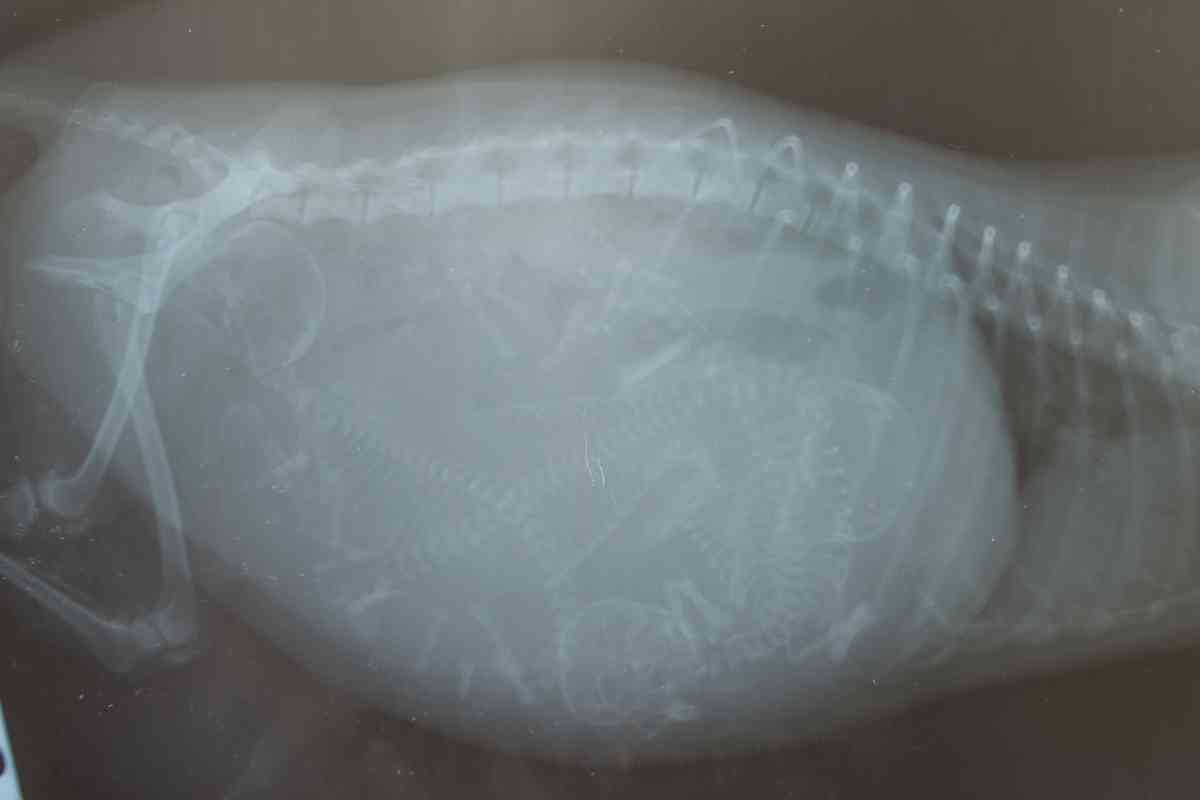How Long Are Goldendoodles Pregnant? Gestational Period Explained!
If you are a Goldendoodle breeder, you are going to want to get familiarized with your dog’s pregnancy needs and gestational period. Breeders have a very important responsibility – to produce and deliver healthy pups with every litter, which is why understanding Goldendoodle gestation is so critical. Although most dogs follow similar gestational stages throughout their pregnancy, each breed has its own distinctions that need to be considered during this process.

How Long Are Goldendoodles Pregnant?
Goldendoodles are usually pregnant between 58 and 68 days – with 63 being the average. A Goldendoodle’s gestation period starts on the day that they ovulate and the pregnancy can be confirmed 21 days after this.
Goldendoodles are incredible mix-breed pups that have become increasingly popular in recent years. There has been a huge surge in demand for designer dogs like the Goldendoodle, given their dynamic and desirable characteristics, which is due to the combination of this dog’s genes.
By combining the Golden Retriever and Poodle, the best qualities of both of these breeds are mixed to create the lovable Goldendoodle. With that being said, it is important to understand that to produce healthy and authentic Goldendoodles, breeding needs to be observed carefully, which is why the pregnancy process is so important.
Reputable breeders know exactly what signs to look for when their Goldendoodle becomes pregnant and they know how to ensure that the Goldendoodle litter is healthy. To help you understand this better, we are going to take a closer look at the Goldendoodle’s pregnancy and gestation period in more detail.
After extensively researching Goldendoodles, I have been able to gather enough information to determine the gestational period of this breed. My research has indicated that proper treatment and care are essential for the health of a Goldendoodle and her litter during pregnancy.
How Long Are Goldendoodles Pregnant?
Generally speaking, a Goldendoodle’s pregnancy is between 58 and 68 days – with most giving birth between 62 and 65 days. It is important to understand that a Goldendoodle does not become pregnant immediately after mating, as there are a number of variables to this that need to be considered.
Most importantly, a Goldendoodle can only be officially confirmed as pregnant when she ovulates. The standard time that this takes is roughly 21 days after ovulation. If ovulation occurs early, then a Goldendoodle may often go into labor sooner than expected.
What is a Goldendoodle’s Gestational Period?

A gestational period for a Goldendoodle starts when the egg is first fertilized and it ends when she gives birth to her litter. Although the time frame can vary for each dog, the average gestation period is between 62 and 65 days.
To have an accurate figure for what a Goldendoodle’s gestation period actually is, the breeder must keep careful track of all dates related to the pregnancy process. This includes the day when the act of mating occurred, as well as the first signs of ovulation.
These are going to be important dates to be aware of to ensure that the gestational period is healthy and that you have a reasonable prediction for when your Goldendoodle goes into labor.
How to Tell if a Goldendoodle is Pregnant
If your Goldendoodle is pregnant she will start to give you signs of this, which is why it is important to observe your dog’s behavior throughout the gestational period. In addition, there are physical symptoms that you need to be aware of, as these can also indicate pregnancy.
When expecting a pregnancy, you should be observant of all of these symptoms, as just one may not be evident of gestation.
Changes in Behavior
The first telltale sign that your Goldendoodle is pregnant will be that her behavior has changed. You may notice that your Goldendoodle is not as ambitious for physical activity. She will likely be less energetic and may want to lay around more. If you are breeding a Goldendoodle that is quite young, this can be easily spotted if the dog is less playful than usual.
Once you notice that your dog is not as physically active, you should see if she is nesting. When a Goldendoodle is pregnant, she will begin creating a nesting area for when the labor process starts, which is generally a safe, quiet, and isolated place where she can relax.
The Goldendoodle will also probably have less energy to do things and may come off as being lazy when instructed with commands – with frequent napping and prolonged sleeping patterns being normal during pregnancies.
Although this may be classified as unusual behavior for a dog, you should keep in mind that this is common behavior during gestation. In addition, much like humans, dogs will have an increased appetite during their pregnancy.
So, if you see her eating considerably more and perhaps unsatisfied with standard food portions, this will also be a sign that the gestation process has begun.
Physical Signs
After you notice some changes in your Goldendoodle’s behavior, you should look out for any physical signs that would indicate pregnancy. The most common symptom is that the dog has gained some weight.
Normally, this would be aligned with an increased appetite. A healthy Goldendoodle that has been well-fed, should gain about 15 to 20% of its normal body weight during the gestational period.
You may also see that your Goldendoodle’s belly has increased in size. Although it may be easy to confuse this with weight gain from eating more food, this is usually their abdomen swelling and is another physical sign of pregnancy.
Lastly, gestation can also be confirmed by looking at your Goldendoodle’s nipples. Once the pregnancy process has started, your dog’s nipples may become larger and discolored.
What Pre-Natal Checks Does a Goldendoodle Need?
Each breeder has a responsibility to deliver healthy pups. Although a major part of this has to do with how they observe their Goldendoodle during the gestation period, it is also vital that they are breeding healthy dogs from the very start.
First and foremost, all necessary vaccines need to be administered before mating can begin. A thorough examination of the Goldendoodle’s health will also need to be conducted, which can be confirmed through a urine, blood, and thyroid test.
Depending on the Goldendoodle’s genes, the dog may be prone to diseases such as hip dysplasia. This is a hereditary disease that is common in a lot of dogs, but the chances of it developing can be mitigated through careful breeding.
A responsible breeder will pay for a vet to run tests on their dogs before breeding them to ensure that diseases like hip dysplasia are not likely to develop. Tests such as these must be performed on both Goldendoodle parents for a healthy litter to be confirmed.
In addition to pre-natal checks, you should also be in contact with your vet for the gestational period of your Goldendoodle. Although having an understanding of the physical and behavioral symptoms of your Goldendoodle’s pregnancy is going to be vital, you also want to confirm the pregnancy officially with the assistance of a professional veterinarian.
This is not only important to verify that the gestation process has started but also to ensure that the Goldendoodle and the litter are healthy. Normally a vet will conduct an ultrasound test to get an idea of the health and condition of the pups weeks before she goes into labor.
Goldendoodle Pregnancy Care
Despite the fact that most of the work during the gestational period is going to come from your Goldendoodle, a responsible owner will give their pup extra attention during their dog’s pregnancy.
You want to observe your dog’s condition and ensure that they are healthy throughout the entire gestational period. These are the things that you should focus on.
Diet
Much like with human pregnancies, maintaining a healthy and balanced diet is going to be essential. Your Goldendoodle needs plenty of food while she is going through her gestation, which will not only require an increased quantity in her diet but also more attention to nutritional intake.
Certain dog food products are designed specifically for puppies, as well as vitamins for pregnant dogs. These products have an increase in healthy proteins, oils, minerals, and other essential ingredients. Your Goldendoodle and her litter are going to benefit from a balanced diet, which will encourage a healthy gestation period.
Excercise
Although you may notice that your Goldendoodle is less active during her pregnancy, you still want to keep balanced exercise a part of her routine. Make sure that you are taking your dog out for casual walks regularly so that she has physical movement on a daily basis.
With that being said, too much exercise is not going to be good for your Goldendoodle. The key is to keep it balanced and moderate. You should not be taking your dog out for lengthy walks – especially not running or going uphill. A good standard is about 3 to 5 short walks per day.
Goldendoodle Labor Process & Litter Size
The main indicator that your Goldendoodle is going into labor will be a change in her body temperature. A healthy dog will have an average body temperature of about 102 degrees Fahrenheit (give or take about 0.5 to 1 degrees).
However, when your Goldendoodle goes into labor, her temperature will drop somewhere between 96 and 99 degrees. That is why you want to make temperature checks routine during the end of her gestational period.
Before she goes into labor, your Goldendoodle will show a lot of physical signs of nesting. Labor will start once she discharges fluid, which will be accompanied by restlessness, contractions, and panting. The amount of time the labor process takes is usually between 8 and 10 hours.
The normal litter size for a healthy Goldendoodle is around 10 pups. However, this figure can fluctuate – with 8 to 11 being quite common.